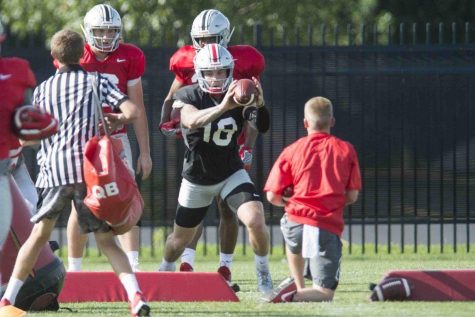Should athletes be required to take P.E?
YES! There are many reasons for athletes to engage in physical activity during the day. Just because they are getting exercise outside of the school day does not mean they are better than any other student. Athletes learn more in various gym classes than they could from their sport, like how to create a workout program, proper ways to lift, diet, nutrition and so much more.
Physical education is part of the national education curriculum, which laws have been implicated to maintain physical education in schools. Taking that program away from certain students, in this case athletes, would be unfair to the rest of the students. It would create a lack of fairness in the school system. Not taking P.E. would give athletes another class to deal with and this causes more stress to complete homework after practices.
Some may say that athletes receive certain privileges that seem unfair to the non-athletic student body. They should be required to participate in gym classes; this would make them seem less just like every other student at this school.
“Yes, I believe athletes should be treated equally as any regular student,” track coach Phillip Harris said. “They should not be excluded from taking advantage of extra classes.”
It may seem as if athletes already receive enough physical activity, but in reality they need more of it to balance out their lack of exercise before and after practices. Enrolling in a physical education class allows their coaches to check on their progress outside of practice.
Not only should athletes have to enroll in gym class because of equality, but also due to the benefit of their physical abilities. Did you know that approximately 17 percent of young people between the ages of 11-19 are obese? This statistic shows the danger of a quick rise in these numbers if gym class was eliminated.
“Physical education is a staple in the American education system in our society and it is important to promote healthy lifestyles,” golf coach Brian Aldenderfer said.
Athletes have the benefactor of achieving more than they could during practices. It allows them to incorporate training into their everyday physical activities. While participating in physical education requirements, the overall obesity rates in students will gradually decrease.
Aldenderfer believes that athletes in gym will aid in combating the growing obesity rates while creating a better, healthier future for the youth. Being able to exercise the body is just as important as exercising the mind.
With the various physical activities gym class provides for students, athletes are able to set examples for the non-athletic students. They learn to play with other students who are not their teammates and they become capable of gaining leadership skills that will benefit them in the future. P.E. does not only teach students about staying fit and working out, they teach students personal fitness and healthy lifestyle choices.
Or
NO! Is three hours of practice a day not enough for student-athletes? Is there a need to push kids who are already physically active past their limit? And what benefit does gym class provide these athletes?
The daily schedule of an athlete is hard enough as it is: six hours of school, two to three hours of practice per day, an average of two or more hours of homework a night and for most athletes a lack of sleep is not unusual.
When you add up the total amount of practice an athlete gets per week on a two hour practice schedule you get a total of 12 hours of practice a week (including Saturday practice). Whereas the average student who has gym every other day only gets four and a half hours of exercise a week at most. Athletes on their average practice schedule almost triple that number in one week.
Back in my freshman and sophomore year, when I was required to take gym, I not only had gym and practice on a given day, but also on game days! I have never thought gym was necessary for athletes, especially ones who do multiple sports throughout the year, so wasting my energy on the day of a big game never thrilled me. Even on days where I only had practice I still needed the energy to practice well. As people always say, “you play how you practice.”
Adding on to my dislike for gym class would be the negative impact it had on my school schedule. Since I was fulfilling my need to exercise on a daily basis, I thought it would be smart to use that elective class to take another class that I was required to take to graduate. However, I couldn’t do that because I was also required to take gym at the same time, which in my case was not benefical to me at all.
On average, students who have practice right after school generally don’t get home until at least 5 p.m on a given night. On game days, varsity athletes don’t get home until at least 10 p.m. So instead of having a period forcing athletes to be more active than we already are, the school should make an exception for athletes to either have a free period to manage their schedules better or to take a required class that works at helping you graduate. I think the obvious answer here is to side with the athletes.
In honesty, what real benefit are athletes getting from playing boccer, team handball, frisby, occasionally runnning the pacer, occasionally doing ten push-ups and taking a test on the rules and regulations of a certain sports game? The intensity of playing a varsity sport far exceeds the intensity of gym class. Most athletes will say that they don’t benefit from it. Since these athletes are also doing the school a favor by participating in their programs all throughout high school and on a daily basis, shouldn’t the school give athetes a little more than just a pat on the back?

Erin Johnson is the Weekend Editor for The A-Blast. She is a senior and this is her fourth year on The A-Blast staff. She is the captain of both the AHS...

Alishia Sampene is a senior at AHS. She enjoys dancing, reading and listening to music. Alishia does not hesitate to give a helping hand. She loves working...





lil juice • May 16, 2019 at 1:24 pm
First of all, students who participate in athletic activities usually practice every day for around two hours. The fact that schools would force them to give up a period in which they could take academically enriching courses to exercise for another hour of the day is dumb. I am tri-sport athlete and am on varsity for all of my sports. My school requires me to take a gym class on top of the exercise I get through my sports. I get sweaty and don’t try during my 1ST HOUR GYM CLASS and it does NOT help me at all.
Dratini MAn • Jan 16, 2019 at 5:06 pm
lil fucking u
Dylan • Jan 16, 2019 at 5:05 pm
I THINK U ARE A RETARD GO HOME KID
jeffery Lognsiang • Jan 16, 2019 at 5:04 pm
i think pe should give everybody a Z+
noah • May 16, 2018 at 3:40 pm
I think that athletes should have to take pe because even if they have 2-3 hours of practice every night, they have 7 hours of school.
yftkt • Apr 25, 2018 at 2:05 pm
lil hacking u
yftkt • Apr 25, 2018 at 2:04 pm
kjuf
Jamel • Feb 21, 2018 at 10:27 am
i think we should you know cause im a hooper straight up
Kay • Feb 6, 2018 at 6:37 pm
In my opinion, as a student athlete, we should not be forced to take gym classes. I believe we should have the option to take them or not. I mean I play a total of 5 sports in one school year and I have practice almost everyday.
Volleyball~4:30-6:30
Basketball~5:30-8:00
track~4:00-6:00
softball~8:00-10:00(in the mornings of Monday,Friday, and Saturday)
And soccer… plus gym classes every Tuesday, Wednesday, And Thursday wich makes me so tired. thanks for listening!
Abby Wilson • Jan 13, 2018 at 11:58 am
I disagree with the no column because it shouldn’t be getting you that tired, gym class isn’t very hard. Gym class really helps get your brain started for the day. It makes you less fidgety, improves memory, and you’re more on task. Gym is like recess for secondary schools.
Roshan • May 8, 2017 at 11:57 am
This helped me a lot on my argumentative essay Thank you
Sophia • Apr 6, 2017 at 9:50 am
You should check this article for the obvious spelling errors.
Dylan Niespodzinski • Mar 6, 2017 at 9:32 am
people who should take sports should have to take p.e. in school because they have to be fit for there sport’s
hi • Feb 21, 2017 at 1:28 pm
hgfdedsxdcfghbnbvfrtyujhytgredfghjnhbgfrfffffghjkujhhhhhhhyhgbtttfvrfdceswsaqqaaaaaaaawsederffffftgyhujuikkkkkkkkkkkollpl
Dezmon • Feb 9, 2017 at 4:09 pm
i think you should have it because they need lots of exercise and they need to work out and and you will be good to go.
Dom • Jan 27, 2017 at 11:34 am
This artical is really helpful tha
nk you
bob • Jan 26, 2017 at 1:32 pm
mi43ekiero,opf43wedm3i
TAZ_SVMPKVNG • Jan 19, 2017 at 12:18 pm
Yea they should i know theres alout of home work but they need the little improvements that they can get
timothy moore • Dec 7, 2016 at 10:11 am
hi my name it tim and i am in sports and i take P.E. i agree
Summer Levi • Oct 21, 2016 at 8:03 am
I love soda so kids need to eat more food!!! %&&N@^&@&(*@
WATERMELON • Oct 13, 2016 at 1:23 pm
Can you add a poll/survey to “Should athletes be required to take P.E?” topic?
It would really help my argument!
Joe Santana • Oct 7, 2016 at 9:42 am
PE sucks